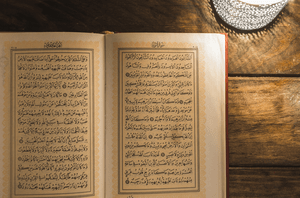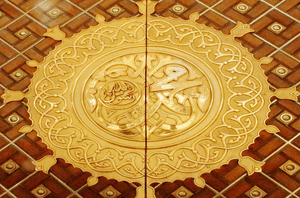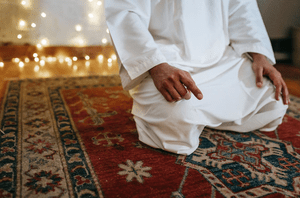Calmness and Tranquility
Attaining khushūʿ in ṣalāh requires time. Give each posture its due and perform it according to the Sunnah. Be calm and do not rush through your ṣalāh just to reach the end.
Abū Hurayrah (raḍiy Allāhu ʿanhu) narrated that a man entered the Masjid to pray whilst the Messenger of Allah ﷺ was in the corner of the Masjid. He then came and greeted him. The Messenger of Allah ﷺ said to him, “Go back and pray, for you have not prayed.” The man went back and prayed and then came to greet him again. The Prophet ﷺ returned his greeting and said, “Go back and pray, for you have not prayed.” On the third time, the man said, “Teach me.” He ﷺ said, “When you stand up for ṣalāh, perform wuḍū thoroughly, then face the qiblah and do takbīr. Recite what is easy for you from the Qur’ān, and then bow until you feel at rest in your rukūʿ. Then raise your head until you stand straight. Then prostrate until you feel at rest in your sajdah. Then get up until you feel at rest in your sitting posture. Then prostrate until you feel at rest in your sajdah. Then get up and stand straight. Then do that in your entire prayer” (Bukhārī).
On another occasion, he ﷺ saw a man who did not perform rukūʿ properly and was pecking in his sujūd whilst he was praying. So he said, “If he was to die like this, he would die on other than the religion of Muḥammad.” Then he said, “The example of the one who does not perform rukūʿ properly and pecks in his sujūd is like the hungry person who eats a date or two; they are not sufficient for him” (Majmaʿ al-Zawā‘id).
Just as eating one or two dates will not satisfy you, rushing through your ṣalāh will prevent you from feeling its sweetness and joy. The ṣalāh will feel laborious and constrictive, and will not nourish your soul. It is for this reason that the Prophet ﷺ forbade us from ‘pecking’ in our ṣalāh. Pecking refers to the time it takes a bird to peck at its food. The Prophet ﷺ said, “The ṣalāh of a man who does not straighten his back in rukūʿ and sujūd is not sufficient” (Tirmidhī).
Whilst praying, avoid glancing to your right or left. Do not fidget or play with a thread in your clothes. Instead, be calm, give each posture its due and keep your thoughts focused on Allah. Saʿīd b. al-Musayyib (raḥimahullāh) once saw a man playing with his beard, so he remarked, “If his heart had khushūʿ, his limbs would also have khushūʿ, i.e. they would be still and humble.”
ʿAbdullāh b. Muslim (raḥimahullāh) said about his father Muslim b. Yasār (raḥimahullāh): “When he would pray, it was as though he was a pole. He would not incline like this or like that.” He was also described as being like “a discarded cloth” when he would pray. He would say to his family, “Speak, as I do not hear what you say.” There was once a fire in his house whilst he was praying. This was mentioned to him and he said, “I did not realise (that it happened).”
Be Eager and Lengthen Your Ṣalāh
Lengthen your ṣalāh to attain khushūʿ. Do this especially when you feel spiritually inspired and can ward off Shayṭān’s whispers. Likewise, aim to lengthen your ṣalāh in virtuous places and during special occasions, such as in the holy cities and during Ramaḍān. Your heart will be more receptive at such times and places, so take advantage by pushing yourself to stand for long durations. Soon, inshā’Allāh, you will taste the sweetness of standing in front of Him and will rush to it eagerly.
ʿĀ’ishah (raḍiy Allāhu ʿanhā) narrated that the Prophet ﷺ used to pray (for so long) during the night that his feet would swell up. She asked him, “Why do you do this, O Messenger of Allah when Allah has already forgiven your previous and upcoming sins?” He ﷺ replied, “O ʿĀ’ishah, should I not be a thankful slave?” (Muslim).
The Prophet ﷺ would stand up during the night and recite lengthy sūrahs. Ḥudhayfah (raḍiy Allāhu ʿanhu) narrates that he saw the Messenger of Allah ﷺ praying at night. He ﷺ “prayed four rakʿāt and recited in them al Baqarah, Āal ʿImrān, al-Nisā’, al-Mā’idah or al-Anʿām” (Abū Dāwūd).
In addition to qiyām, the Prophet ﷺ remained in rukūʿ and sujūd for an equally long amount of time. ʿAwf b. Mālik (raḍiy Allāhu ʿanhu) says, “I stood up to pray along with the Messenger of Allah ﷺ one night. He got up and recited Sūrah al-Baqarah. When he came to an āyah of mercy, he stopped and made duʿā’, and when he came to an āyah of punishment, he stopped and asked for Allah’s protection. Then he bowed for as long as he stood (reciting Sūrah al-Baqarah), saying in his rukūʿ: سُبْحَانَ رَبِّـيَ الْعَظِيْمِ . Then he prostrated for as long as he stood, reciting the (above). Then he stood up and recited Sūrah Āl ʿImrān and then recited many sūrahs, one after the other” (Abū Dāwūd). In another narration, ʿĀ’ishah (raḍiy Allāhu ʿanhā) mentioned that the duration of each of his prostrations would be equivalent to reciting fifty āyāt (Bukhārī).
The Prophet ﷺ would pray for so long that even his Companions (radiy Allāhu ʿanhum) would become tired. ʿAbdullāh b. Masʿūd (raḍiy Allāhu ʿanhu) said, “One night, I prayed with the Messenger of Allah ﷺ. He prayed for so long that an evil thought came to me.” It was said, “What was it?” He replied, “I thought of sitting down and leaving him” (Muslim).
The length of the Prophet’s recitations and prostrations indicate how much joy and contentment he experienced in his ṣalāh. Following in his footsteps, the Companions (radiy Allāhu ʿanhum) and the righteous of this ummah have also been known to spend hours conversing and pleading with their Lord. ʿUthmān (raḍiy Allāhu ʿanhu) would complete the entire Qur’ān in one rakʿah. Similar feats have also been reported about Tamīm al-Dārī, Saʿīd b. Jubayr and Imām Abū Ḥanīfah (raḥimahumullāh) amongst others . Such lengthy acts were only possible because Allah placed barakah in their time.
“If your hearts were pure, they would never have enough of reciting Allah’s words.” – ʿUthmān b. ʿAffān (raḍiy Allāhu ʿanhu)






